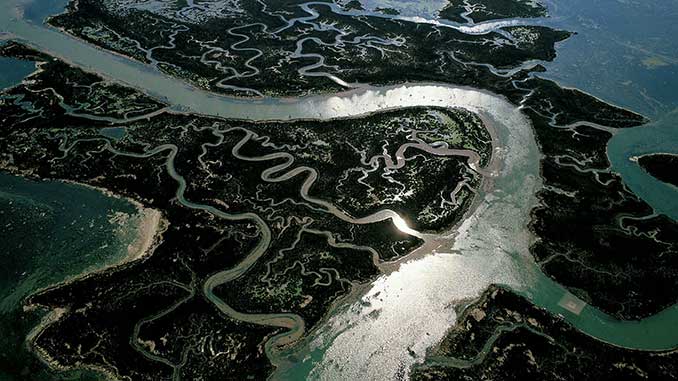 Throughout history, rivers have shaped our landscapes and our journeys; flowed through our cultures and dreams. RIVER takes its audience on a journey through space and time.
Throughout history, rivers have shaped our landscapes and our journeys; flowed through our cultures and dreams. RIVER takes its audience on a journey through space and time.
Spanning six continents, and drawing on extraordinary contemporary cinematography, including satellite filming, the film shows rivers on scales and from perspectives never seen before.
Its union of image, music and sparse, poetic script create a film that is both dream-like and powerful, honouring the wildness of rivers but also recognising their vulnerability.
Rivers are the wondrous sculptors of the elaborate landscapes found on planet Earth. They wear away mighty mountains, scour rock faces, carve deep valleys, and create fertile plains and then decorate them with their meanderings.
In many places, rivers are seen as a source of great hope and something to be worshipped. In others they are where people are healed and blessed, where sins are washed away and the dead purified.
Rivers are the arteries of the planet. Wherever they travel life forms can emerge, survive, perhaps flourish, including human life. The will of rivers determined our early destiny.
They were the transport routes that enabled and nourished human spread and the boundaries between regions and countries. Just as rivers shaped the landscape, they have also shaped human existence.
Rivers are fundamental to human existence but are indifferent to human plans and dreams. As the recent floods in Queensland and the New South Wales’ Northern Rivers have shown, they can wreak havoc, though in drought, they can disappear. And so, extraordinary means have been devised to control them and harness their force.
The grandest dams provide power and prosperity, slake the thirst of millions, and allow deserts to bloom all year, but trapped and static, the water stagnates, and its sediment falls to the dam floor where it’s inaccessible to those who depend on the fertility it would otherwise have delivered.
The use of poisons and plastics, and the sheer size of the human population, means many rivers are living precariously or even fighting for survival. With humanity sharing its fate with rivers, the wash up will determine the destinies of future generations.
Though all is not lost – yet. Rivers are irrepressible and, given the chance, possess miraculous powers of recovery. Also, the cycle of renewal continues. Upon vanishing into oceans, the heat from the sun draws rivers up into the atmosphere ready to fall back to Earth reincarnated.
The sequel to the 2017 hit documentary MOUNTAIN, reuniting the creative team of director Jennifer Peedom, the Australian Chamber Orchestra, narrator Willem Dafoe and writer Robert Macfarlane, RIVER is a profound cinematic and musical reflection on how rivers have shaped both the planet’s elaborate landscapes and all human existence.
Work on RIVER formally began in early 2020, when the research began in earnest and when thoughts, ideas and information began moving constantly between the film’s writers, being Macfarlane, Peedom and co-director and co-writer Joseph Nizeti. Over time the script began to take shape. As is usual with documentary, the writing process continued until the film was finished.
Writer and Fellow of Cambridge University, Robert Macfarlane, is clearly pleased that the sparse nature of the final narration script leaves room not just for music but for silence too. “I love that feeling of creating a very thin line of silk or thread which runs through the film texturally, rather than overexplaining and over dominating,” he says.
“RIVER takes a birds’-eye view of humanity’s relationship with our most precious resource through time,” said Peedom and Nizeti. “It is a story about the limits of human control, and how our short-sighted attempts to control nature have backfired. It is about the fragmentation of rivers and the long-term impact of this on the living world.”
RIVER includes astounding visuals of rivers taken from well above the ground, some of it only available due to recent advances in drone technology. In some the twists and turns of rivers look like gorgeous artistic renderings of stands of trees.
“There is something amazing about looking at rivers from space,” says Peedom, citing footage from NASA and the work of visual artist Benjamin Grant, who uses satellite imagery to provide insights into how human action impacts the world.
Peedom and her co-director Joseph Nizeti are very grateful to the cinematographers and others who worked with them to capture the footage, some of it at great personal risk.
French filmmaker Yann Arthus-Bertrand, a master of aerial photography, Ben Knight, Sherpas Cinema, Renan Ozturk and Pete McBride were the key cinematographers on RIVER. Peedom was also excited to discover and work with young Australian Rory McLeod, a cinematographer with a great love of nature.
“Through our collaboration with the Australian Chamber Orchestra, the extraordinary score takes us on a journey from Bach, to Jonny Greenwood and Radiohead, featuring original composition by Richard Tognetti and Indigenous musician William Barton,” said Peedom and Nizeti.
“Richard’s experience composing and arranging for string orchestras is second to none in Australia and his touch is very evident in the richness of the string textures and in the performance quality of RIVER’s final score.”
RIVER screens in selected cinemas from Thursday 24 March. For more information, visit: www.madmanfilms.com.au for details. Checkout the trailer here!
Image: RIVER (film still) – photo by Yann Arthus-Bertrand
